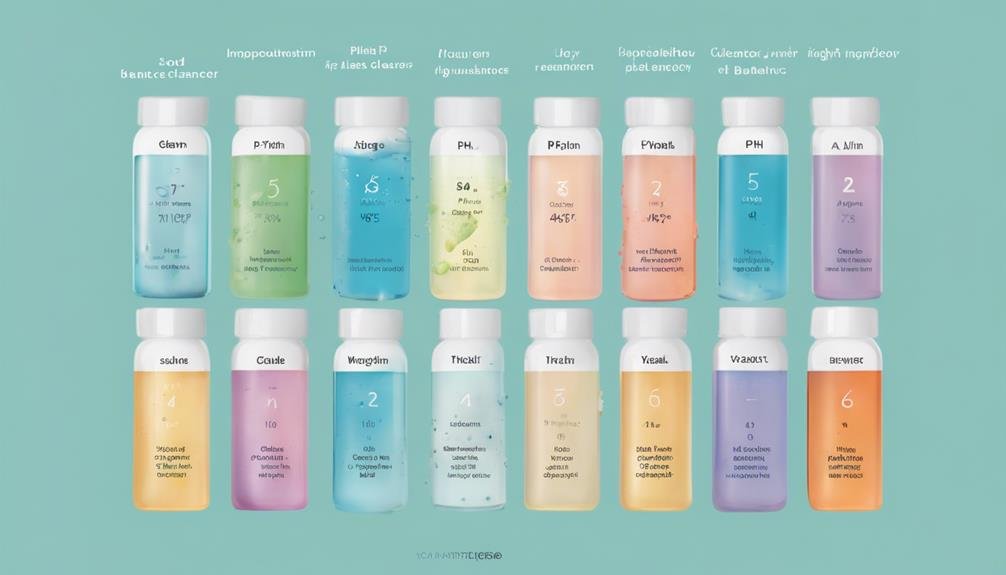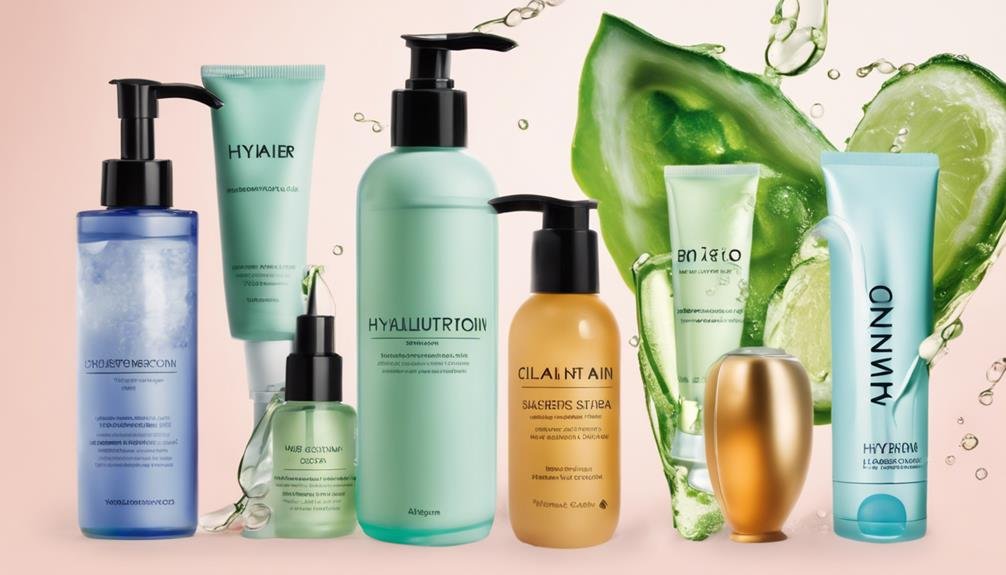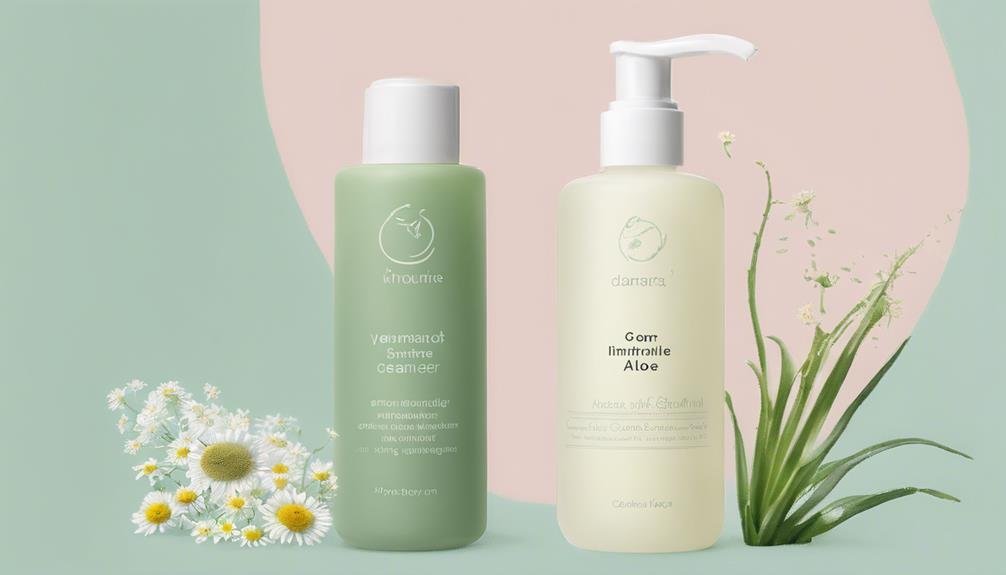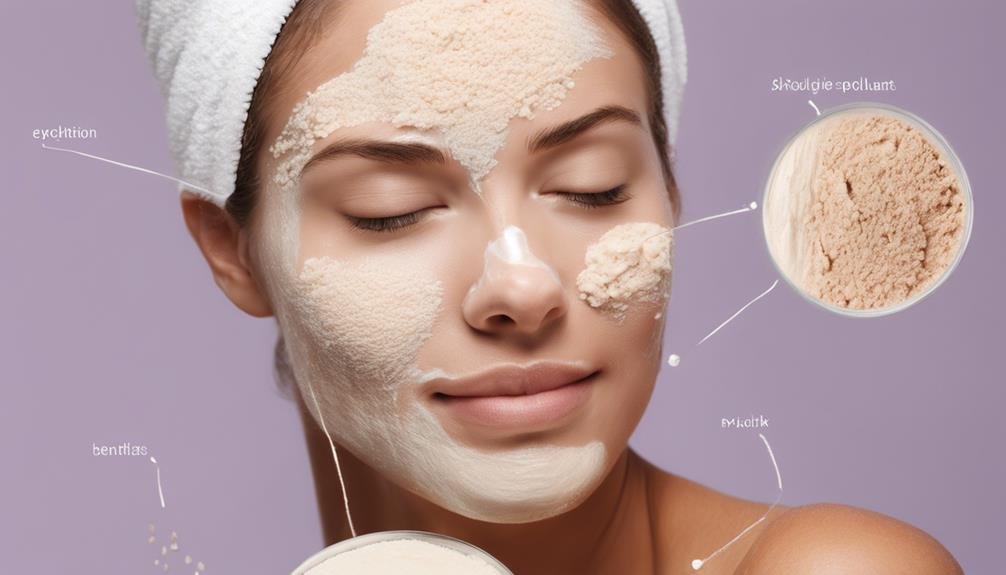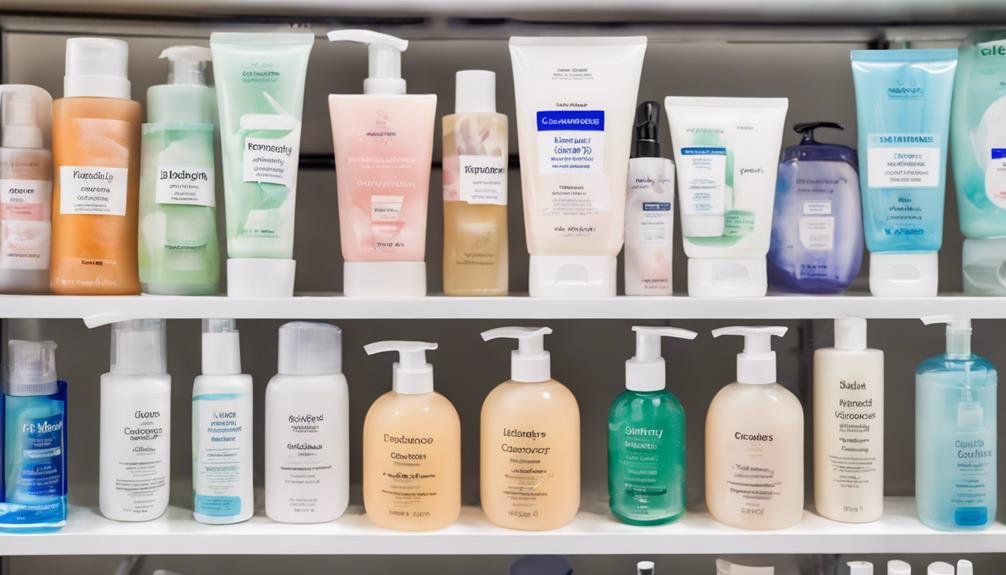If you've ever wondered why choosing the right cleanser is crucial for your skin, you might be surprised by the impact it can have on your overall skincare routine. Understanding your skin type and specific concerns is the first step in finding the perfect cleanser that will cater to your needs. From oily skin battles to sensitive skin woes, each skin type requires a tailored approach when it comes to cleansing. Stay tuned to discover essential tips and tricks to help you navigate the world of cleansers and achieve a healthy, glowing complexion.
Key Takeaways
- Consider skin type: oily, dry, combination, sensitive.
- Check ingredient list for gentle surfactants and hydrating components.
- Opt for pH-balanced cleansers to protect skin's barrier.
- Avoid harsh chemicals like sulfates and parabens.
- Seek dermatologist advice for personalized recommendations.
Skin Type Assessment
When choosing the right cleanser, the first step is to accurately assess your skin type. Understanding your skin type is crucial in selecting a cleanser that will effectively address your specific needs. There are generally four main skin types: oily, dry, combination, and sensitive.
Oily skin tends to produce excess sebum, leading to a shiny complexion and potential acne breakouts. Dry skin lacks moisture, often feeling tight and flaky. Combination skin is a mix of oily and dry areas, requiring a balanced approach. Sensitive skin is easily irritated and may react to certain ingredients.
To determine your skin type, observe how your skin feels throughout the day, especially after cleansing. Oily skin may feel greasy, while dry skin can feel tight. Combination skin will have both oily and dry areas, and sensitive skin may experience redness or stinging. Consulting with a dermatologist or skincare professional can also help you accurately assess your skin type for tailored recommendations.
Understanding Ingredients
To make informed decisions about the right cleanser for your skin, understanding the ingredients in skincare products is paramount. Ingredients play a crucial role in determining how a cleanser will interact with your skin.
Look for cleansers with gentle surfactants like sodium lauroyl sarcosinate or cocamidopropyl betaine, which effectively cleanse without stripping the skin of its natural oils. Consider ingredients like glycerin, hyaluronic acid, or ceramides for added hydration and moisture retention.
If you have sensitive skin, avoid products containing fragrances, alcohol, or harsh exfoliants like physical beads or walnut shells. For acne-prone skin, seek out cleansers with salicylic acid or benzoyl peroxide to target breakouts.
Remember that everyone's skin is unique, so it may take some trial and error to find the perfect cleanser for you. By understanding the ingredients in your skincare products, you can make more informed choices that cater to your skin's specific needs.
Ph Balance Importance
Maintaining the pH balance of your skin is essential for a healthy complexion. Your skin's pH level is around 5.5, which is slightly acidic. This acidity helps to protect your skin from harmful bacteria and maintains its natural barrier function. When the pH balance is disrupted, issues like dryness, sensitivity, and breakouts can occur. Choosing a cleanser that matches your skin's natural pH can help keep your skin balanced and healthy.
Many traditional soaps have a high pH, which can strip your skin of its natural oils and disrupt its delicate balance. Opting for a gentle, pH-balanced cleanser can help prevent these negative effects. Look for cleansers labeled as "pH-balanced" or with a pH level close to that of your skin to ensure you aren't causing unnecessary stress to your skin.
Avoiding Harsh Chemicals
To keep your skin healthy and balanced, it's crucial to be mindful of the ingredients in your skincare products. When choosing a cleanser, it's important to avoid harsh chemicals that can strip your skin of its natural oils, leading to dryness, irritation, and potentially even more serious skin issues.
Look for cleansers that are free of sulfates, parabens, synthetic fragrances, and alcohol, as these ingredients can be too harsh for your skin.
Opt for gentle cleansers that contain natural and soothing ingredients like aloe vera, chamomile, or green tea. These ingredients can help cleanse your skin effectively without causing any harm.
Additionally, consider opting for cleansers labeled as "pH-balanced" or "gentle," as these are more likely to be suitable for daily use without disrupting your skin's natural balance.
Hydration Needs
Ensuring adequate hydration for your skin is essential for maintaining its health and vitality. Hydrated skin appears plump, radiant, and youthful. When choosing a cleanser, opt for one that helps support your skin's hydration needs. Look for ingredients like hyaluronic acid, glycerin, or ceramides, which attract and lock in moisture. These components can aid in preventing dryness and maintaining your skin's natural moisture barrier.
It's important to note that over-cleansing or using harsh cleansers can strip your skin of its natural oils, leading to dehydration. To maintain optimal hydration levels, consider your skin type and concerns.
Dry skin may benefit from creamy or oil-based cleansers, while oily or combination skin could benefit from gel or foaming cleansers that won't clog pores.
Acne-Prone Solutions
Supporting your skin's needs when dealing with acne requires selecting the right cleanser. Look for cleansers containing salicylic acid or benzoyl peroxide, as these ingredients help to unclog pores and reduce acne-causing bacteria. Salicylic acid is especially effective for exfoliating and removing dead skin cells, preventing breakouts. Opt for a gentle, non-abrasive cleanser to avoid irritating your skin further.
Foaming cleansers can be beneficial for acne-prone skin, as they help to remove excess oil without stripping the skin of its natural moisture.
When choosing a cleanser for acne-prone skin, avoid harsh ingredients like alcohol, which can dry out the skin and exacerbate acne. Instead, opt for products labeled as non-comedogenic, meaning they won't clog pores. It's important to cleanse your skin twice a day, morning and night, to remove dirt, oil, and makeup that can contribute to breakouts.
Remember to follow up with a suitable moisturizer to keep your skin hydrated and balanced. By selecting the right cleanser for your acne-prone skin, you can effectively manage breakouts and promote clearer, healthier skin.
Sensitive Skin Considerations
Considering sensitive skin when choosing a cleanser is crucial to maintain skin health and prevent irritations. If you have sensitive skin, opt for gentle, fragrance-free cleansers with minimal ingredients to reduce the risk of irritation. Look for products labeled as hypoallergenic or formulated for sensitive skin to ensure they're less likely to cause adverse reactions.
Avoid cleansers containing harsh chemicals like sulfates, alcohol, and artificial fragrances, as these can strip the skin of its natural oils and lead to dryness and redness. Instead, choose cleansers with soothing ingredients like aloe vera, chamomile, or oat extract to calm and hydrate sensitive skin.
Remember to patch test new products on a small area of skin before using them on your face to check for any potential reactions. By selecting a gentle cleanser tailored to sensitive skin, you can effectively cleanse without compromising your skin's health and comfort.
Anti-Aging Benefits
With the constant advancements in skincare, choosing a cleanser that offers anti-aging benefits is essential for maintaining youthful and radiant skin. As we age, our skin undergoes changes such as decreased collagen production and a slower cell turnover rate, leading to the appearance of fine lines, wrinkles, and dullness. Opting for a cleanser enriched with ingredients like antioxidants, peptides, and hyaluronic acid can help combat these signs of aging.
Antioxidants such as Vitamin C and E protect the skin from free radicals that contribute to premature aging. Peptides stimulate collagen production, promoting skin elasticity and firmness. Hyaluronic acid, known for its hydration properties, plumps up the skin and diminishes the look of wrinkles. When choosing an anti-aging cleanser, look for gentle formulas that cleanse without stripping the skin of its natural oils.
Incorporating an anti-aging cleanser into your skincare routine can help you achieve a more youthful complexion and maintain healthy skin for years to come.
Exfoliation Techniques
To enhance the effectiveness of your anti-aging skincare routine, understanding proper exfoliation techniques is key. Exfoliation helps remove dead skin cells, allowing for better absorption of anti-aging products.
There are two main types of exfoliation: physical and chemical.
- Physical exfoliation involves using granular substances or tools to physically scrub away dead skin cells. This method can be effective but should be done gently to avoid irritating the skin.
- Chemical exfoliation, on the other hand, involves using acids like alpha-hydroxy acids (AHAs) or beta-hydroxy acids (BHAs) to dissolve dead skin cells. This method can be gentler and more suitable for sensitive skin types.
When incorporating exfoliation into your skincare routine, it's important to start slow and gradually increase frequency to avoid over-exfoliation, which can damage the skin barrier. Aim to exfoliate 1-3 times per week and adjust based on how your skin responds. Remember to follow up with a moisturizer to keep your skin hydrated and protected after exfoliation.
Makeup Removal Effectiveness
For effective skincare, understanding the importance of makeup removal is crucial. Properly cleansing your face of makeup is essential for maintaining healthy skin. Makeup left on the skin can clog pores, leading to breakouts and dullness. When choosing a cleanser for makeup removal, consider your skin type and the effectiveness of the product in removing different types of makeup. Here is a comparison table to help you choose the right cleanser based on makeup removal effectiveness:
| Cleanser Type | Makeup Removal Effectiveness |
|---|---|
| Oil-based Cleanser | Highly effective at removing stubborn makeup, including waterproof products. Best for dry skin. |
| Micellar Water | Gentle yet effective in removing light to medium makeup. Suitable for all skin types. |
| Foam Cleanser | Effective for light makeup removal. Ideal for oily or acne-prone skin due to its deep cleansing properties. |
| Cleansing Balm | Excellent for dissolving makeup, including heavy products. Suitable for all skin types, especially dry skin. |
Choose a cleanser that aligns with your skin type and makeup removal needs for optimal skincare results.
Budget-Friendly Options
Searching for effective skincare shouldn't break the bank. When it comes to budget-friendly cleansers, there are plenty of options that can provide effective cleansing without costing a fortune. Look for cleansers with ingredients like salicylic acid or glycolic acid for gentle exfoliation and deep cleaning. These ingredients can help unclog pores and remove dead skin cells, promoting a clear complexion. Additionally, consider cleansers with hydrating ingredients like hyaluronic acid or ceramides to maintain skin moisture balance.
Drugstore brands often offer affordable yet quality cleansers that cater to different skin types, from oily to dry. Some popular budget-friendly options include Cetaphil Daily Facial Cleanser, Neutrogena Hydro Boost Hydrating Cleansing Gel, and Cerave Hydrating Facial Cleanser. These cleansers are formulated to effectively cleanse the skin without stripping it of its natural oils.
Dermatologist Recommendations
When considering skincare products, seeking recommendations from dermatologists can provide valuable insights into choosing the right cleanser for your skin type and concerns. Dermatologists often suggest gentle cleansers with ingredients like hyaluronic acid for dry skin to help retain moisture.
For oily or acne-prone skin, dermatologists may recommend cleansers containing salicylic acid or benzoyl peroxide to unclog pores and prevent breakouts.
Individuals with sensitive skin might benefit from fragrance-free and hypoallergenic cleansers to avoid irritation.
It's important to consult with a dermatologist to determine your skin type and any specific concerns before selecting a cleanser. Dermatologists can also recommend products based on any skin conditions you may have, such as eczema or rosacea. They can provide personalized advice tailored to your skin's unique needs, ensuring you choose a cleanser that promotes healthy skin without causing any adverse reactions.
Frequently Asked Questions
Can I Use the Same Cleanser for Morning and Night Routines?
You can use the same cleanser for both your morning and night routines if it suits your skin type. However, some may prefer a different formulation for each time of day to address specific skin concerns.
How Long Should I Wait Before Applying Moisturizer After Cleansing?
After cleansing, wait 1-2 minutes before applying moisturizer. This allows your skin to fully absorb the benefits of the cleanser without interference. Keeping a brief gap can enhance the effectiveness of your moisturizer for optimal hydration.
Is It Safe to Use a Cleansing Brush or Tool Daily?
Using a cleansing brush or tool daily can be safe if done gently and with the right product. Choose soft bristles and avoid over-exfoliating. Monitor your skin's reaction and adjust frequency as needed for a healthy glow.
Can I Mix Different Cleansers to Target Specific Concerns?
You shouldn't mix different cleansers unless they are specifically designed to work together. Combining products can disrupt your skin's natural balance, leading to irritation or other issues. Stick to using one cleanser at a time for best results.
Should I Change My Cleanser Seasonally for Different Skin Needs?
You should consider changing your cleanser seasonally to address varying skin needs. Warmer months may call for a lighter, hydrating cleanser, while colder weather might benefit from a more nourishing option. Tailoring your skincare routine can optimize results.
Conclusion
As you navigate the world of skincare, remember that the right cleanser can be like a gentle rain washing away the worries of the day, leaving behind a fresh canvas for your skin to flourish. Take the time to assess your skin type, understand ingredients, and prioritize hydration to achieve a glowing complexion. With careful consideration and expert guidance, you can find the perfect cleanser to pamper and protect your skin.



